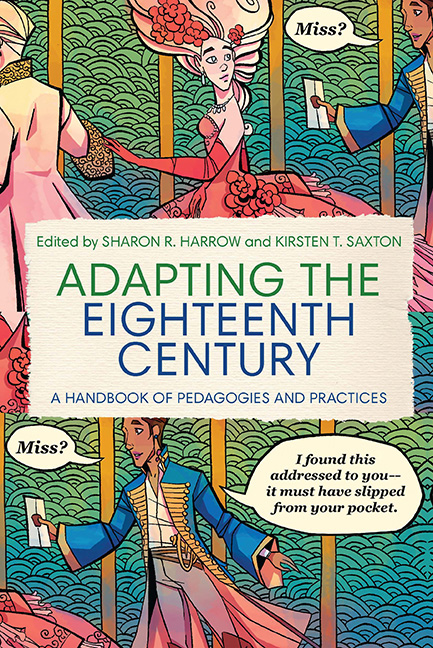Book contents
- Frontmatter
- Dedication
- Contents
- Acknowledgments
- Introduction
- 1 “Je suis Voltaire,” or, Appropriating the Philosophe in the Social Media Age
- 2 “Who Lives, Who Dies, Who Tells Your Story?”: The Uses of Hamilton in Special Collections Pedagogy and Public Engagement
- 3 Performing Frankenstein in the South: Sex, Race, and Science across the Disciplines
- 4 French Fairy Tales and Adaptations in the Twenty-First-Century Classroom
- 5 Select Trials at the Sessions-House in the Old-Bailey (1742) and Mark Ravenhill’s Mother Clap’s Molly House (2001)
- 6 Teaching with The Pilgrim’s Progress Video Game
- 7 Eliza Haywood’s “Bad Habits”: Teaching Adaptations of Fantomina: or, Love in a Maze and The Distress’d Orphan; or, Love in a Madhouse
- 8 Teaching Eighteenth-Century Literature through Eighteenth- Century Adaptations: Adaptive Structures
- 9 “A Private Had Been Flogged”: Adaptation and the “Invisible World” of Jane Austen
- 10 Fifty Shades of Pamela in the Undergraduate Classroom
- 11 Teaching the Austen-Monster-Mashup: Sense and Sensibility and Sea Monsters
- 12 Learning to Adapt: Teaching Pride and Prejudice and Its Adaptations in General Education Courses
- 13 Race and Romance: Adapting Free Women of Color in the Long Eighteenth Century
- 14 The Crusoeiana: Material Crusoe
- 15 Adaptation in Strange Places: Terrence Malick’s To the Wonder and the Narrative Effect and Form of Samuel Richardson’s Pamela
- 16 Adapting the Tombeaux des Princes: A Study in Media Variations
- 17 Experiential Pedagogy to Join the Thread of Conversation with Paul et Virginie
- 18 “Lookin’ for a Mind at Work”: Hamilton, Adaptation, and Enlightenment Ideals for the Core Curriculum
- Notes on the Contributors
- Index
11 - Teaching the Austen-Monster-Mashup: Sense and Sensibility and Sea Monsters
Published online by Cambridge University Press: 26 April 2020
- Frontmatter
- Dedication
- Contents
- Acknowledgments
- Introduction
- 1 “Je suis Voltaire,” or, Appropriating the Philosophe in the Social Media Age
- 2 “Who Lives, Who Dies, Who Tells Your Story?”: The Uses of Hamilton in Special Collections Pedagogy and Public Engagement
- 3 Performing Frankenstein in the South: Sex, Race, and Science across the Disciplines
- 4 French Fairy Tales and Adaptations in the Twenty-First-Century Classroom
- 5 Select Trials at the Sessions-House in the Old-Bailey (1742) and Mark Ravenhill’s Mother Clap’s Molly House (2001)
- 6 Teaching with The Pilgrim’s Progress Video Game
- 7 Eliza Haywood’s “Bad Habits”: Teaching Adaptations of Fantomina: or, Love in a Maze and The Distress’d Orphan; or, Love in a Madhouse
- 8 Teaching Eighteenth-Century Literature through Eighteenth- Century Adaptations: Adaptive Structures
- 9 “A Private Had Been Flogged”: Adaptation and the “Invisible World” of Jane Austen
- 10 Fifty Shades of Pamela in the Undergraduate Classroom
- 11 Teaching the Austen-Monster-Mashup: Sense and Sensibility and Sea Monsters
- 12 Learning to Adapt: Teaching Pride and Prejudice and Its Adaptations in General Education Courses
- 13 Race and Romance: Adapting Free Women of Color in the Long Eighteenth Century
- 14 The Crusoeiana: Material Crusoe
- 15 Adaptation in Strange Places: Terrence Malick’s To the Wonder and the Narrative Effect and Form of Samuel Richardson’s Pamela
- 16 Adapting the Tombeaux des Princes: A Study in Media Variations
- 17 Experiential Pedagogy to Join the Thread of Conversation with Paul et Virginie
- 18 “Lookin’ for a Mind at Work”: Hamilton, Adaptation, and Enlightenment Ideals for the Core Curriculum
- Notes on the Contributors
- Index
Summary
In 2009, Jane Austen and Seth Grahame-Smith's Pride and Prejudice and Zombies and Austen and Ben H. Winters's Sense and Sensibility and Sea Monsters launched a twenty-first-century fad: the Austen-monster-mashup. The Austen-monster-mashup adds monsters and terrifying plots to the text of an Austen novel, thus providing readers with an uncanny version of the source text. In part, this uncanniness stems from the adaptation's alternate universe—including worlds where zombies roam the English countryside or giant jellyfish attack folks on the coast. However, the monster-mashup's attention to horror and the supernatural cannot fully explain the alternate universe's eerie effect. The adaptations’ doppelgangers are largely responsi- ble for creating the unheimlich. As I argue in this chapter, a paired reading of an Austen novel and its monster-mashup double encourages readers to analyze how the adaptation's doppelgangers bring out and enhance charac- teristics found in the source text. In examining the monster-mashup as a form of adaptation, and specifically Sense and Sensibility and Sea Monsters as a text, this chapter explains what readers can learn from the monster deriva- tive about the Austen source text. To show instructors how this pedagogical approach works, the chapter concludes with a plan for teaching Sense and Sensibility and Sense and Sensibility and Sea Monsters together; the chapter finally explores what students learn by making the transition from reading texts to creating their own adaptations.
The Austen-Monster-Mashup: “Something You’d Actually Want to Read”
When Quirk Classics published Pride and Prejudice and Zombies, the press facetiously claimed that it turned “a masterpiece of world literature into something that you’d actually want to read.” Critics hastily interpreted this joke as a serious attack on Austen's writing. For instance, Stephen Shapiro attests, “The aim of the new mash-up fiction like Pride and Prejudice and Zombies (2009) is to mock not just canonical literature but also the titles that are particularly beloved by women, who might allow their own emo- tional investment in Jane Austen to allow for learning the sense and sensibil- ity of zombie codes.” While critics of the monster-mashup have identified the subgenre as lowbrow hack writing aiming to disparage highbrow litera- ture, Ben Dew argues that Quirk “exploit[s] the comic potential of the divi- sion between these categories.”
- Type
- Chapter
- Information
- Adapting the Eighteenth CenturyA Handbook of Pedagogies and Practices, pp. 169 - 183Publisher: Boydell & BrewerPrint publication year: 2020



